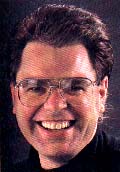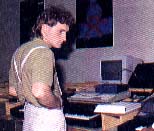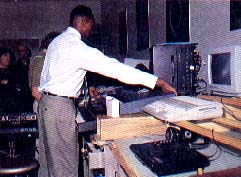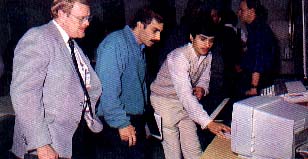Atari Goes to College
A Four-Year Degree-In MIDI
BY MARD NAMAN
START CONTRIBUTING EDITOR
Looking for a new career? Are you a computer nut who likes music? Or a music nut who likes computers.? Now there's a college program that's perfect for you. Cogswell College in Cupertino, California is offering the West Coast's first four-year degree program in Music Engineering Technology and the computer of choice is the Atari ST.
 |
||
| A typical work station in the Cogswell College Music Engineering Technology Lab. |
||
 |
||
| Eric Peterson is the Dir- ector of Cogswell Col- lege's new Music Engin- eering Technology pro- gram. | ||
Eric Peterson speaks with the enthusiasm and conviction of a true believer. "I know the market is ready for a MIDI College," he says. "Electronic musical instruments did $300 million in sales last year. Who's going to fix that stuff? Who's going to write software for it? Who's going to provide technical support?"
If Peterson has his way, the answer to all of the above questions will be the graduates of the West Coast's first four-year degree program in Music Engineering Technology. The program is being offered by Cogswell College in Cupertino, California, and Peterson is the director.
 |
| Cogswell College's innovative Music Engineering Technology program has drawn students from all over the world. Here, junior student Johann Kristiannson as- sists at the Open House. |
To help get this pioneering program off the ground, Atari has donated 10 STs for use in the college's MIDI lab. Students will learn exclusively on the STs--which, of course, is the way it should be, because there is no finer computer for making music. MIDI pros like Peterson are unreserved in their praise "I'm an enthusiastic promoter of those things I think are the best in the world, so my attitude toward Atari is one of extreme enthusiasm," he says. "My allegiance is wholehearted. I use it professionally; I use it here at the school. I vastly prefer Atari for music over Macintosh--it eats Mac alive And Atari software is written right."
Future career opportunities will be plentiful for MIDI-literate people. They will be doing everything from music sales to software design to hardware technical support. They will hold jobs ranging from recording studio engineers to customer service representatives, from service technicians to music composers, from MIDI systems design consultants to rock stars. And Atari is there on the ground floor to help train them.
It's Happening Now
What's surprising is how fast this is happening. "A few years ago it would have been unimaginable that enough people would have entered the field of high-tech music to open a college," says Peterson. "Today it seems like a logical extension." Indeed.
 |
| If you're interested in MIDI, music or STs, then Cogswell College in Cupertino, California is the place to be. Harold Johnson, shown here, is a junior at Cogswell in the Music Engineering Tech- nology Program. |
As affordable MIDI instruments have exploded on the scene in the last two years, the one missing element has been a systematic approach to teaching all there is to know. Until now, people have been forced to learn in a hit-or-miss fashion. However, by combining expertise in music technology, computer engineering and electronics, the Cogswell program plans to give students the skills to not only function, but thrive in the music and computer industries. Perhaps the need for this school is best expressed by Dave Kusek, president of Passport Designs. "I wish there'd been a program like this years ago," he says. "We sure would have had an easier time staffing our company." But the price for this training will not be cheap. Tuition for full-time students will be $3,000 per semester.
To introduce the program last November, the College held an open house and invited many representatives from the electronic music industry. In addition to Atari, representatives from Yamaha Pro, Passport Designs, E-mu and DigiDesign demonstrated the latest hardware and software products.
At the open house, two things were immediately obvious. First, it's a hands-on, very practical program with a lab component to every class. "We make engineers," says Peterson. "We don't have a football team. We don't have a TV station. This is all we do: create technical engineers with practical skills for the job market. It's like the Japanese style of instruction, which generates practical technology more than research and development. In reality, that's what we need in this country. Japan's got 400 engineers per 10,000 people. We've got 70. Our goal here is to close the gap."
Secondly, the program is very small now, though it may grow rapidly. In addition to the STs, the lab has benefited from the donation of great samplers and sequencers from E-mu (the Emax) and Casio (the FZ-1). There are only 10 students so far and Peterson is the only instructor. With 10 MIDI stations in their current lab, each student basically has his or her own equipment to use at all times. "I'd like to see up to 20 students this year" says Peterson. "One to a station is great, but I know it can work with two." The plan is to expand the program over the next two or three years to a maximum of 185 students. They would then have 10 lab rooms and eight full-time instructors. "It's ambitious," says Peterson, "but I'm convinced that the market is there."
Cogswell is over 100 years old and already offers degrees in computer science, electronics and mechanical engineering. Their track record in these fields is very good indeed: according to Peterson, 95 percent of Cogswelis graduates are working in their field after four months.
The music technology program does not have to be a four-year commitment. The school offers a one-year certificate program. In both cases, students can either go two days a week, or if they have a day job, three nights a week.
The first semester alone gives students a solid grounding in MIDI. It includes four courses, starting with MIDI Fundamentals, which teaches MIDI vocabulary and practical application of MIDI theory, including systems diagrams. Next comes Sound Analysis and Design, which covers how to program synthesizers and develop samples on samplers. Students edit sound libraries, learn analog and digital synthesizer programming and explore sound creation and alteration. Music Technology examines the historical impact of technology on music style and performance and looks at basic audio recording principles and techniques. Music Skills teaches musicianship, keyboard and ear training proficiency. As Peterson says, "An engineer with a pack of pens needs to know the difference between Bach and rock. He needs to be able to create stuff on his own."
The second semester is equally ambitious. Students learn system design, time code compatibility and sound accompaniment for video and audio post-production. They learn digital signal processing in multi-track recording, software-assisted recording technique, automated mixing and applied sound design for MIDI composition and song production.
 |
| Ted Bahas of Digidesign (far right) demonstrates the latest MIDI software to Tom Bunker of Kurzweil Music Systems and Mard Naman, START Contributing Editor. |
If it sounds very technical, that's because it is. "In one year every student should be a MIDI monster because he's working six hours a day--two classes, each with two hours of guided lab work and one hour lectures," says Peterson. "At the end of the second semester, we're going to have industry people come in and look into the crystal ball for us. Each student will walk out of here with his feet on the ground. He'll be equipped to go into the field and start working. A retail store or studio will jump to hire someone like this because he'll be qualified."
This Side of the Screen
If the first year teaches what Peterson likes to call "this side of the screen," years two and three take students deep inside the machines. He says, "We're going to catch up on DC and AC circuits, structural programming, microcomputer programming, digital principles. It's all way inside the screen. These lectures will have the same content as normal computer classes, but when we get to the lab, students will build a musical device. Instead of building a generic modem, they'll build a MIDI interface. After four years, a guy could tear the board apart, do digital repair or any kind of troubleshooting." In the fourth year, says Peterson, "We'll have agreements with recording studios so that we can send students out and offer credit for field work."
Class Schedules
The school's curriculum was carefully developed with the help of an advisory board made up of respected electronic music industry leaders. They include Scott Wedge, president of E-mu Systems, Dave Kusek, president of Passport Designs, Peter Gotcher, president of DigiDesign and Dominic Milano, editor of Keyboard Magazine.
At the open house advisory board members made themselves available to answer prospective students' questions. DigiDesign showed off its hot new Notator sequencing program that runs on the Atari 1040ST and can do everything in real time. Passport Designs demonstrated its Master Tracks Pro sequencing program and E-mu put its excellent Emax sampler through its paces. Back in the MIDI lab, five students made music and talked with prospective students.
The first few students might be a microcosm of the range of people potentially interested in this program. There's a guy who works in the computer industry but wants to get specific music skills. There's a professional musician who has some free morning time and wants to learn MIDI. Another student is from Iceland and is studying to be an engineer and another, Robert Lewis, is an aspiring record producer. Before coming to Cogswell, Lewis had enrolled in a recording studio program in San Francisco, but found it lacking. "It just scratched the surface," says Lewis. "I wanted to get much more in depth than that."
"This is exactly what I want to do," he says. "I love electronics, computers and music and this program is the perfect blend of all three for me. When I get out, my options will be unlimited."
Lewis says the program so far has been "really hard core. You really have to want to do it. A year ago I would have said, 'What do I need this stuff for?' Now I know what I didn't know, and that makes me want to learn more. I want to get inside the machine."
Music Redefined
Outside the lab, advisory board member Scott Wedge talked about the need for MIDI education for musicians. "The entire process of making music is being totally redefined," he says. "We're now dealing with instruments that are completely orchestral in capabilities. Where does a musician learn how to play an orchestra? Until now, the answer has been word of mouth, or they asked a buddy or they went to a store and the store didn't know. It's time for this school. "
Wedge says that while MIDI instruments make life easier for musicians in some ways, in other ways they make life more challenging. Says Wedge, "Now, not only does the musician simply play the piano, but since he can play piano and drums and strings at the same time, how does he make it sound good? He can be the composer, arranger, orchestrator and conductor all in one. So we have basic courses in how to use these tools to make interesting music."
"Digital sampling allows these instruments to duplicate musical sounds exactly. It's completely natural and possible to work in any musical medium. I don't mean to say it replaces the symphony orchestra at all, because musicianship and keyboardship are precious art-forms and it would kill me to see them hurt. But for a composition student, sitting down with a sequencing program and a sampler, it's like being the orchestra. It's the way all the musical scores are done for movies, TV, records and commercials. It's just the way music is being made now--with MIDI studios, often never going to paper at all. Yet we still need the classical knowledge of how to arrange instruments. What is music? What sounds good and what doesn't? We have to bridge that gap. With this program I think we can do just that."
"These instruments have only been available at affordable prices for two years," adds Wedge. "Traditional music programs are totally unequipped to really teach electronic music technology. Most schools are still in the stone ages. They don't have a MIDI lab; they don't have personal computer labs; their instructors don't have a place to go to learn this material; they can't introduce these tools to their students because their instructors don't know about it. They only know traditional compositional tools."
So Wedge's goal is not only to teach students but to teach teachers. "I hope to see teachers enrolling here--piano teachers, instructors at music schools--because that's when we'll really get the leverage."
By creating this ambitious program that serves the serious musician, the engineer and the teacher alike, Cogswell has gone a long way toward establishing educational standards for the new and rapidly growing field of MIDI music. "I want the industry to see that we're leaders," says Peterson. "What we're doing here can be used as a model for other schools that will open. We're pioneering a model so people will say, 'They're doing it right at Cogswell' ".
Mard Naman is a freelance magazine and television writer and a Contributing Editor of START.